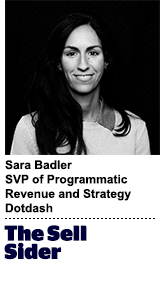
“The Sell Sider” is a column written by the sell side of the digital media community.
Today’s column is written by Sara Badler, senior vice president of programmatic revenue and strategy at Dotdash.
It seems like every quarter a new programmatic transaction type or deal comes into play and the market must quickly adapt. Concepts such as high frequency-cap private marketplaces, audience guarantees and programmatic guaranteed plus audience lists are created, rolled out and enter the product suite and seller toolkit with regularity.
However, while new types of deals are common, its uncommon for them to fade from use. But that is what appears to be happening with private auction deals. I am seeing buyers increasingly move away from private auction deals toward preferred deals, programmatic guaranteed and the open market. But it would be a shame for private auction deals to fall by the wayside when they offer so many benefits for both buyers and sellers.
In defense of private auctions
Buyers and sellers alike have always seemed to just fall back on private auctions. This transaction type is easy and quick to set up and provides instant value for both sides of the deal. The line between private auctions and the open market has steadily blurred, begging the question : What’s the difference?
Private auctions allow multiple buyers to compete in an enclosed, brand-safe and premium environment. While these private auctions occur, however, competition for similar inventory is simultaneously happening outside of the auctions in the open market. If buyers can access comparable inventory in both private auctions and the open market, agencies and publishers are left to debate whether or not it is productive to have both options running.
Personally, I believe the private auction is beneficial to both buyers and sellers. Private auctions are a quick and easy way for buyers to test programmatic premium, and they provide marketers with the assurance that their ads will run on only the domains for which they are intended. As ad fraud and domain spoofing remain industrywide problems, this issue continues to be important. From a sales perspective, it is helpful to be able to provide buyers with options and levels of commitment for pricing and priority purposes.
Behind the shift
More and more buyers are moving toward preferred deals and programmatic guaranteed as they discover how efficient these deal types can be. With private marketplaces and programmatic guaranteed, advertisers no longer have to execute invoices across multiple publishers, bill accounts receivable or search through their billing systems to configure and actualize these numbers. This saves time and resources as the financial burden of running multiple publisher and buyer deals is lifted – payment is fully handled by the tech platforms.
Furthermore, demand-side platforms allow all buying data to be stored in the same place, which is handy and convenient. It can be considered a one-stop shop for all data and buying reporting, creating beneficial efficiencies.
The open market is also seeing shifts and changes in buyer behavior. Ads.txt has helped buyers feel more confident in the inventory they are purchasing on the open market, providing them with the assurance that the URLs they are buying are the ones they originally intended to buy. They see transparency in CPMs and inventory, which leads to increased speed and efficiency for traders. The open market is effective, efficient and thought of as a transparent marketplace.
Organizational effects
If buyers move away from private auction transactions en masse, how will sales teams be affected? Most will experience some impact, and how publishers position themselves afterward will be important.
Private auctions allow publishers and advertisers to dip their toes in the water, allowing them to date before calling themselves an official couple. This is obviously beneficial for both sides, and publishers will need another way to allow potential partners to do that. If that will happen through the open market in the future, that is OK, but it will impact sales teams that previously relied on private auction revenue to reach their goals. Changes to compensation, sales strategy and pricing seem to be inevitable – publishers should expect sales teams to clamor for compensation for their clients’ open market spend.
Many platforms have heavily invested in developing and building out new programmatic guaranteed products and capabilities that include universal frequency caps, enhanced reservation buying and new inventory options. These products are working well and enjoy increasing advertiser adoption. However, programmatic guaranteed buys can be costly, and price-sensitive buyers may be forced back into the open market.
Advertisers doing fewer private auction deals will change how publishers position their open-market inventory. It might be a similar change to what we experienced when we moved from first-price to second-price auctions. Buyers can take a more thoughtful and responsible approach to open market buying by using blacklists, whitelists and frequency capping. This can mitigate some of the negative impact of a “spray-and-pray” type of strategy. Also, if advertisers or agencies invest in DMP technology, they can collect and organize their first-party data and take advantage of that powerful tool on top of an open market line item.
This post was syndicated from Ad Exchanger.


More Stories
McDonald’s Christmas Light Show is an Ode to Spontaneous Drive-Thru Dinners
Behind the Scenes of Coca-Cola’s AI Reinvention of a Holiday Classic
Here’s the Roundup for the Week Ending November 15